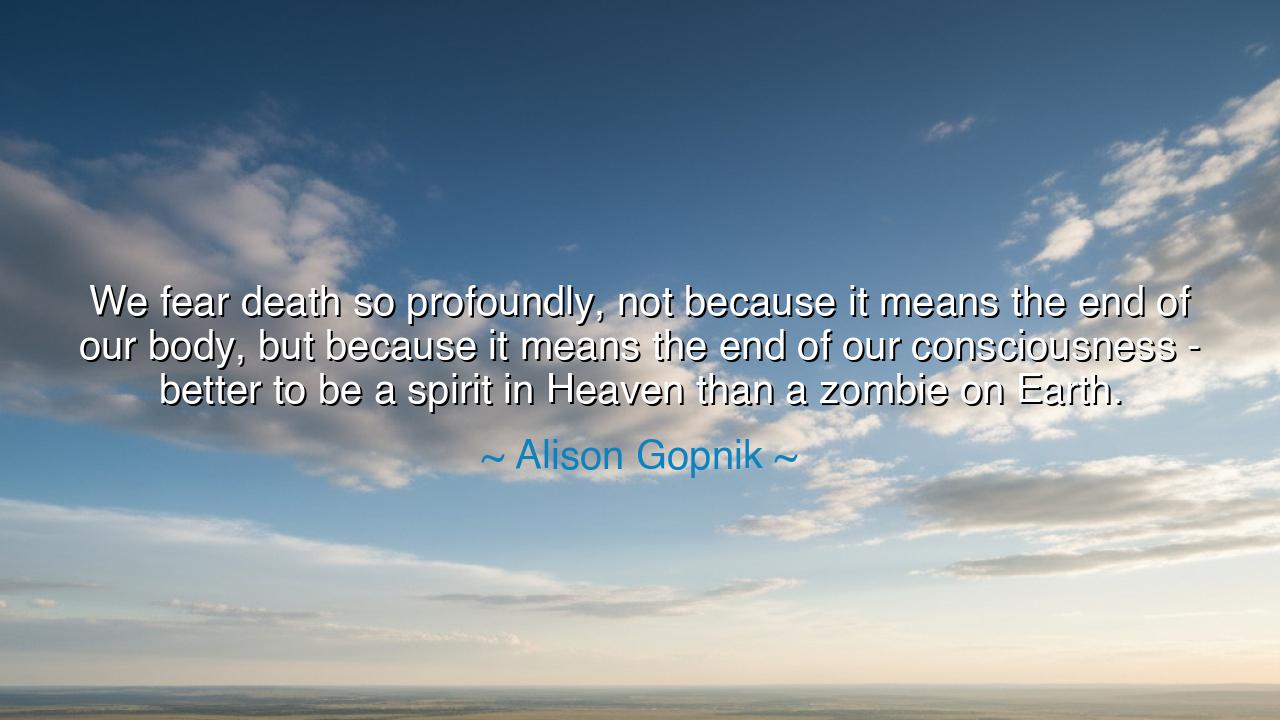
We fear death so profoundly, not because it means the end of our
We fear death so profoundly, not because it means the end of our body, but because it means the end of our consciousness - better to be a spirit in Heaven than a zombie on Earth.






The words of Alison Gopnik, when she said, “We fear death so profoundly, not because it means the end of our body, but because it means the end of our consciousness — better to be a spirit in Heaven than a zombie on Earth,” shine like a mirror held up to the human soul. They speak to a truth far deeper than mere mortality — to the ancient terror that lies not in the stillness of the grave, but in the loss of awareness, the extinguishing of that divine spark which allows us to feel, to think, to love, and to know ourselves. Her words remind us that what we most dread is not nonexistence, but the dimming of the light that makes existence meaningful.
From the earliest dawn of civilization, the question of consciousness has haunted humankind. The Egyptians sought to preserve it through mummification, believing the soul could live eternally in the afterlife. The Greeks spoke of the psyche, the immortal essence that departs at death. And yet, across all these ages, there lingered the same fear: that to lose the mind’s awareness — that bright window through which we perceive creation — is to fall into a darkness more profound than death itself. Thus, Gopnik’s words echo across millennia, carrying the wisdom of both philosopher and mystic: that what we are, truly, is not flesh, but awareness in motion.
When she says, “better to be a spirit in Heaven than a zombie on Earth,” she draws a sharp and sacred line between being alive and merely existing. To live without consciousness — to drift through days unfeeling, unthinking, unawakened — is to become what the ancients feared most: a being severed from the soul. The zombie she speaks of is not a creature of horror, but a symbol of modern numbness — of those who walk among us but have forgotten to feel wonder, gratitude, or love. Her words are a call to awaken, to remember that to be conscious is to be alive in the fullest sense.
In the ancient world, there is a tale of Orpheus, who journeyed into the underworld to bring back his beloved Eurydice. Though his body trembled, his spirit blazed with awareness and purpose. He played his lyre with such beauty that even the stones wept and the dead paused to listen. It was not strength of body that guided him through darkness, but the illumined consciousness of love and art — proof that awareness is the bridge between the mortal and the divine. Gopnik’s reflection is born of this same truth: that to be conscious is to participate in the sacred, and that to lose consciousness — through death, despair, or numb indifference — is the greatest loss of all.
And yet, her words are not steeped in despair. They carry a message of acceptance and reverence. For if consciousness is our greatest gift, then death — the end of consciousness as we know it — is not an enemy to be feared, but a mystery to be met with awe. It may be that in dying, the mind does not vanish, but transforms — just as water, when it ceases to be liquid, becomes cloud and rain again. The spirit in Heaven, in her words, is a symbol of continuation — not of the flesh, but of awareness beyond form. Better, she says, to let that awareness rise to new heights than to remain earthbound, dulled and hollow.
The lesson in her wisdom is both spiritual and practical: to live consciously. To truly see the world, to question, to feel deeply, to love without distraction — for this is what it means to be fully alive. The ancients taught that consciousness is not a possession, but a flame that must be tended. Every moment we awaken from ignorance, every act of compassion, every pursuit of truth keeps that flame alight. In contrast, to live without awareness — to allow ourselves to become mechanical, unthinking, indifferent — is to die before our time.
So let those who hear this teaching remember: the fear of death is natural, but the greater tragedy is to live as though already dead. Nurture your consciousness, for it is the divine thread that binds you to eternity. Seek not only survival, but awakening. Let each sunrise be a reminder that you are not a body merely moving through time, but a soul capable of reflection and wonder. And when the day comes that your awareness fades, let it not fade in vain — let it be said that you lived fully, thought deeply, and loved fiercely, until the final breath carried your spirit to the next horizon.
For truly, as Alison Gopnik teaches, it is better to be a spirit in Heaven than a zombie on Earth — for Heaven is not only a place beyond the stars, but a state of awareness in which the soul, alive and luminous, meets the infinite and calls it home.






AAdministratorAdministrator
Welcome, honored guests. Please leave a comment, we will respond soon